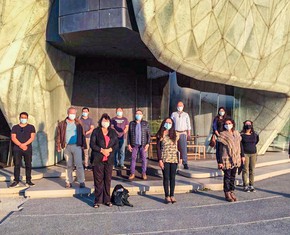The views expressed in our content reflect individual perspectives and do not represent the authoritative views of the Baha'i Faith.
We sometimes forget this foundational fact in our modern urban culture, but everyone owes their very existence to the natural world.
You and I are part of the web of life, connected and interwoven, children of the Creator and Mother Earth. The Earth, the soil and the rocks and the rivers and the plants and the animals, are all alive in a very real way, all part of the mutuality of life itself:
The favors of God are unending, limitless. Infinite bounties have encompassed the world. We must emulate the bounties of God, and just as each one of them—the bounty of life, for instance—surrounds and encompasses all, so likewise must we be connected and blended together until each part shall become the expression of the whole. – Abdu’l-Baha, The Promulgation of Universal Peace, p. 16.
When we ponder deeply upon the connection and interdependence of beings, we clearly realize that the life of every being draws benefit and sustenance from all the other innumerable existences. This mutual helpfulness is realized either directly or through mediation, and if, for the twinkling of an eye, this confirmation and assistance does not descend upon the living being, that one will become non-existent, for all the existing things are linked together and draw help from each other. Therefore, the greatest foundation of the world of existence is this co-operation and mutuality. – Abdu’l-Baha, Star of the West, Volume 4, p. 138.
Indigenous cultures know this truth. Most live close to the Earth, and rely on her for their daily sustenance and shelter. Perhaps that’s why anthropologists and archaeologists have never discovered an indigenous culture that lacks a belief in a Supreme Being.
But today, living in our concrete and steel cities, many of us now have what psychologists call nature deficit disorder—our homes and schools and workplaces and cars wall us off and disconnect us from the natural world. We’ve forgotten, or never known, our profound connection to the Earth and to all other living things. We have, in the words of mental health professionals, a damaged human-nature relationship. That relationship allows us to befoul our nest—to pollute our planet with impunity.
Richard Louv, the author who coined the phrase in his book Last Child in the Woods: Saving Our Children from Nature Deficit Disorder, says:
An increasing pace in the last three decades, approximately, of a rapid disengagement between children and direct experiences in nature … has profound implications, not only for the health of future generations but for the health of the Earth itself.
Louv’s work focuses on reintroducing children to nature, and has helped inspire an international movement variously known as “free-range parenting,” “slow parenting” or “simplicity parenting,” in which parents allow their children to explore the world at their own pace, without a constant welter of organized activities, competitive sports and so-called “helicopter parenting.” His work has also contributed to the establishment of organizations like the Children & Nature Network, which believes that nature has the power to make children healthier, happier and smarter:
… over the last few generations, childhood has moved indoors, leaving kids disconnected from the natural world. This worldwide trend has profound implications for children’s healthy development—and the future of our planet. – Children & Nature Network Mission Statement
When parents raise children with open access to the natural world, Louv concluded after a ten-year study, those children gain more respect for themselves and for our planet. Instead, we’ve kept our children away from nature, forgotten creation, and in the process they’ve come to doubt its Creator. The Baha’i teachings clearly say that is a mistake, since nature embodies God’s will and its expression:
Nature in its essence is the embodiment of My Name, the Maker, the Creator. Its manifestations are diversified by varying causes, and in this diversity there are signs for men of discernment. Nature is God’s Will and is its expression in and through the contingent world. It is a dispensation of Providence ordained by the Ordainer, the All-Wise. Were anyone to affirm that it is the Will of God as manifested in the world of being, no one should question this assertion. It is endowed with a power whose reality men of learning fail to grasp. Indeed a man of insight can perceive naught therein save the effulgent splendour of Our Name, the Creator. – Baha’u’llah, Tablets of Baha’u’llah, p. 142.
Distance from nature and the created world have made many of us forget and forego the Creator. There is a reason tribal, agrarian and indigenous peoples from just about every era in human history were never atheists: they saw the work of the Great Spirit, understood themselves as part of the creation, and lived in awe of that majesty and beauty and power. They acknowledged and thanked the Creator because the creation gave them life.
















Comments
Sign in or create an account
Continue with Googleor